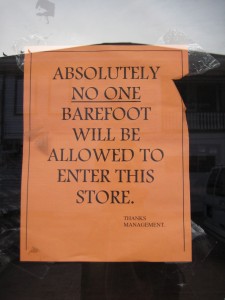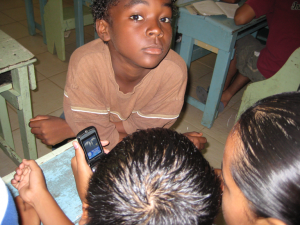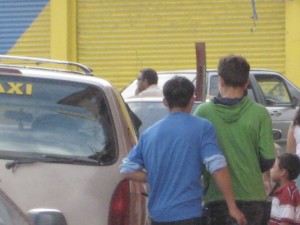Archive for the ‘Prototypes’ Category
No Shoes No Payless
This sign:
is on the front of this store:
I don’t know if this is a legitimate Payless or not, but they do have a nice selection of shoes. Beyond it being hilarious that you are not allowed into a store to buy shoes if you don’t already own a pair, I think there are deeper implications. In a way, this sign emphasizes how hard it can be to break out of a cycle of poverty to join the consumption class.
Displays of wealth
In interviews and conversations, lots of people have told me about younger kids (ages 7-14) carrying around cell phones just to look cool. In what I’ve seen, kids are using the phones as still and video cameras, as well as a video and music player. I’ve seen songs transferred via bluetooth and groups of people crowded around a cell phone screen watching a music video. Below is Shewan with his friends looking at his red Razr phone, which he brought to one of the summer camps held at schools in western Belize my group is running. His aunt, who lives in the States, sent it to him as a present.
I saw the guy below in the blue tshirt walking in the center of San Ignacio, and though the picture does it no justice, he had tucked the earbuds of his iPod behind his ears though he wasn’t listening to music. (**Edit 28 August 2008 - I saw this same things several more times during the rest of my time in Belize.)
Paper mache
We’re doing paper mache this week at my group’s fourth and final camp for primary school children. I’m excited to see the design choices that the kids make. Specifically I’m interested in seeing how they deal with a multi-day project. The camps have been designed to work on self-esteem, self-expression, and self-awareness through arts and sports.
Also, I carried out six interviews while I was in Cayo, and I’d like to do a few more in Belize City during this week and next. I’m working on pulling out important bits of the conversations and transcribing them.
Design Missteps
 The main brick column here is about 6 feet tall. I assumed that the top of it was closed off, so I set my wallet and two sets of keys on it, which promptly fell into a crevice. It took the hotel staff about 30 minutes to help me fish out my belongings with wire hangers. The builder of the building happened to be eating dinner at a table about 10 feet from the column during the event.
The main brick column here is about 6 feet tall. I assumed that the top of it was closed off, so I set my wallet and two sets of keys on it, which promptly fell into a crevice. It took the hotel staff about 30 minutes to help me fish out my belongings with wire hangers. The builder of the building happened to be eating dinner at a table about 10 feet from the column during the event.
–
The San Ignacio market has about 10 vendors on weekdays, but on Saturdays the market area is flooded with a huge number of merchants. In the last year, a new, large structure was built for the market to house the everyday vendors and a new concrete slab was laid for the weekend merchants to set up temporary tents on.
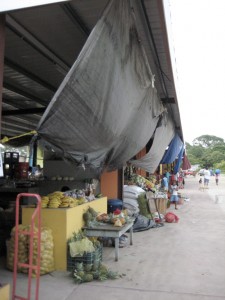
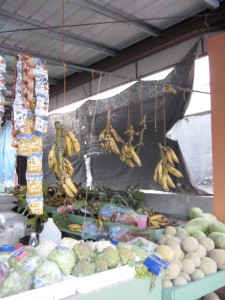 I think it’s great that there is investment being put into infrastructure for something so obviously important to the local economy, but I think there are a few major oversights in the design of the site. The most major one is that the majority of the vendors are on a north-south axis and the east to west brightly shining sun blasts in on the vendors and their products essentially all day every day. To deal with this, all of the vendors have strung up tarps or sheets to block out the sun.
I think it’s great that there is investment being put into infrastructure for something so obviously important to the local economy, but I think there are a few major oversights in the design of the site. The most major one is that the majority of the vendors are on a north-south axis and the east to west brightly shining sun blasts in on the vendors and their products essentially all day every day. To deal with this, all of the vendors have strung up tarps or sheets to block out the sun.
Additionally, the design of the stalls just doesn’t seem to consider what will happen in them. Every stall has added a system of ropes and pipes to hang bananas and other good off for selling. They are making the most of their space, but the design of the stall could have anticipated and assisted in this and other produce selling needs.
Also:
Conversation standing map; show and tell
I listened in on a conversation between a group of teachers where the cheaper you got your cell phone credit for, the higher your standing in the conversation was:
(Double up is when you buy a certain amount of credit over $20, and you get double the amount of credit you purchased. It’s been happening the last few weekends.)
Also yesterday, we had show and tell. Kids brought dolls, stuffed animals, and jewelery. Almost everything brought was a gift. One of the kids brought a cell phone, which was a present from an aunt. It was a red Rarz. Though the student didn’t have credit on the phone, he still carried it around, and this made him look cool. Several adults have told me about kids doing this.
Channeling my inner Ira Glass
I’m beginning to do a few informal interviews with people I’ve got to know in San Ignacio. I’m focusing on international (/***edit 15 June) technologically facilitated communication. I’m interested in what people are doing now to communicate with those abroad, what specific problems they see, and how they could see things being easier and better for them. I’d appreciate any suggestions on questions you think could provoke interesting discussion or insights.
Rough questions to get me going in conversation (in no particular order):
- Do you own a cell phone?
- Do you have a land line?
- What phone do you use to call abroad?
- How often do you call the US or abroad?
- How often to you text (SMS) the US or abroad?
- Do you own a computer?
- Do you often us a computer?
- Do you use email?
- Do you use Hi5 or another social network?
- Do you contact people abroad with Hi5 or another network?
- How else do you contact people abroad?
- How long have you owned a cell phone?
- If you could either pay your cable bill or put credit on your cell phone, which would you choose?
- If you could either pay your land line bill or put credit on your cell phone which would you choose?
- How old are kids when they get their first mobile phone?
- When kids have a parent abroad, how do you think they communicate with them?
- Do you trust the phone company?
/***edit 15 June
- How do you generally communicate with people in Belize?
- Do you do anything to conserve your mobile credit?
/***edit 16 June
- Follow up “Why?” questions to all questions
prototype_0
A role prototype about mobile banking. It doesn’t say much more than what is possible with mobile banking right now. You can currently transfer credit via SMS to another pre-paid account. What I’m considering here is how people could use cell phone credit as currency.
I’d really like to pursue some project in mobile banking, but money issues may put research into that beyond the scope of possibilities.
Prototypes_0
I need to get my brain thining in prototype mode, so I made myself make a look-and-feel and a role prototype. Here they are:
Look-and-feel prototype for an SMS hurricane/tropical storm alert system for Belize. It could be a national system. It could be law that when a person buys a cell phone they must enroll or be asked if they’d like to enroll in the alert system.
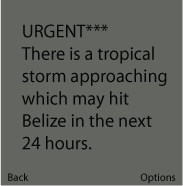
There are huge technical issues here, but for me one big issue is how this would be made sustainable for the long-term. Would it survive politcal transition? What would it take to have people trust this as a reliable source of information? Perhaps, who should the SMS come from for it to be trusted? An NGO or the government?
Role prototype for an imaginary SMS based system which helps streamline micro-business operations.
In work I’ve done with volunteer groups looking into micro-business management, business-owners have had very low skills with money managment and other basic busienss planning. If such a system were to exist, what would be most useful? If fincancial information was being transmitted, what would need to be done for business owners to be comfortable with using the system?
More generally: what are tasks that people use computers for that mobile phones could replace, allowing greater access to people living in poverty who can much more easily (financially and logistically) purchase a phone versus a computer?
